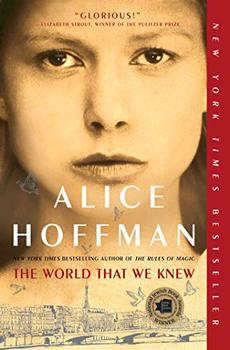Summary | Excerpt | Reading Guide | Reviews | Beyond the Book | Readalikes | Genres & Themes | Author Bio

Grandmother was called Bobeshi. She had been born in Russia and in her stories wolves ruled the snowy forests, they knew how to escape from the men on horseback who carried rifles and shot at anything that moved, even the angels. Lea was a shy, intelligent girl, always at the top of her class when school had been in session and Jews were allowed to attend. She sat close to Bobeshi while the old woman told how as a girl she had walked alone to a great, rushing river to get water each morning. Once a black wolf had approached her, coming so close she could feel his breath. They had stared at each other, and in that moment she'd felt that she knew him and that he knew her in return. In stories a wolf might have torn her to shreds, but this one ran back through the trees, a beautiful black shadow with a beating heart. A wolf will seldom attack, Bobeshi always said, only when it is wounded or starving. Only when it must survive.
Hanni Kohn was not the sort of person to give in to demons, although she knew they now roamed the streets. Everywhere there were ruach ra'ah, evil spirits, and malache habbala, angels of destruction. Her husband had saved so many people she refused to believe his life had meant nothing. It would mean, she had decided, that no matter what, their daughter would live. Lea would live and she would save more souls, and so it would go, on and on, until there was more good in the world than there was evil. They could not let it end this way. Hanni had no choice but to survive until their daughter was safe. She found ruined gardens and dug in the earth for young onions and shallots, from which she fashioned a family recipe called Hardship Soup, made from cabbage and water, a food that sustained them while others were starving. She went out after curfew to cut branches from bushes in the park so they might have wood to burn in their stove even though the smoke was bitter. Dressed all in black so that she would be nearly invisible, she ventured into the muck of the river Spree, where she caught fish with her bare hands, even though doing so was a serious offense punishable by lashings and prison and deportation. The fish sighed in her hands, and she apologized for taking their lives, but she had no choice, and she fried them for dinner. She was a wolf, from a family of wolves, and they were starving.
Her plan was to steal from the tailor's shop where she had once worked. In the last years of her husband's life, Jewish doc- tors had been paid nothing, and she had become a seamstress to support the family. It was a talent that came to her naturally. She had always sewn clothes for her mother and daughter, all made with tiny miraculous stitches that were barely visible to the naked eye. But now the Jewish shops had all been destroyed or given over to Aryan owners. The only work for Jews was forced labor in factories or camps; one had to hide from the roundups when the soldiers came in search of able-bodied people, for this kind of work was meant to grind workers into dust. In a time such as this it wasn't difficult to become a thief, all you needed was hunger and nerve. Hanni had decided to bring her daughter along. Lea was tall and looked older than her age; she would be a good student when it came to thievery. She understood her grandmother's stories. Demons were on the streets. They wore brown uniforms, they took whatever they wanted, they were cold-blooded, even though they looked like young men. This is why Lea must learn how to survive. She was to remain in the alleyway while Hanni went to search for anything left behind by looters. If anyone came near she was to call out so that her mother could flee the shop and avoid arrest. She held her mother's hand, and then she let go. Lea was only a girl, but that didn't matter anymore. She knew that. Be a wolf, her grandmother had told her.
She was waiting for her mother, standing on broken glass, hidden in the shadows as Hanni rummaged through the shop. Hanni knew where tins of tea and beans were stored for the employees' lunch, and where the best satin ribbon was kept, and, if they hadn't yet been stolen, where the shop owner hid a few silver teaspoons inherited from a great-aunt.
Excerpted from The World That We Knew by Alice Hoffman (copyright © 2019 by Alice Hoffman). Reprinted with permission from Simon & Schuster. All rights reserved.
Your guide toexceptional books
BookBrowse seeks out and recommends the best in contemporary fiction and nonfiction—books that not only engage and entertain but also deepen our understanding of ourselves and the world around us.